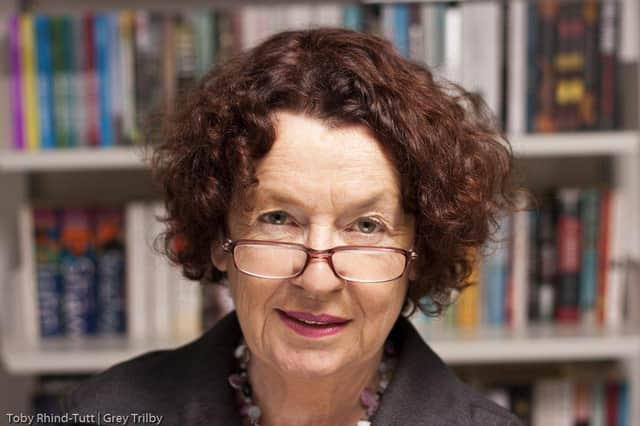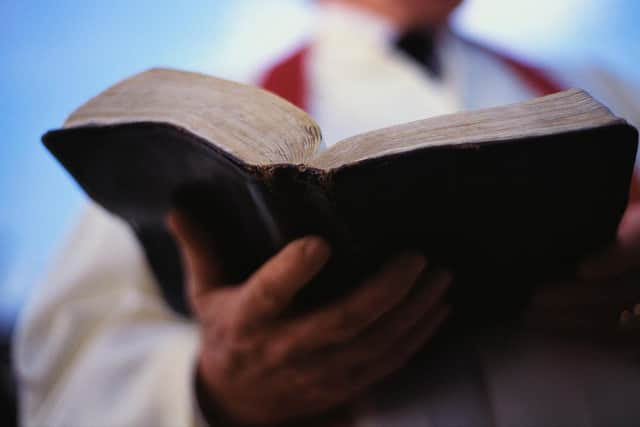Ruth Dudley Edwards: It is superficial to blame religion for the Troubles in Northern Ireland


“All I ask is that you don’t make me do it.”
He reminded me of the Cambridge University philosopher Professor Arif Ahmed, a courageous campaigner for free speech, who recently led a successful revolt in Cambridge University against the vice-chancellor’s demand that all staff should sign a declaration promising to respect the opinions of others.
No, said Ahmed. I will tolerate all opinions, but I will not necessarily respect them.


Advertisement
Hide AdAdvertisement
Hide AdI had to learn tolerance in my twenties. In my early teens I had taken as much of a dislike to the authoritarian Irish Roman Catholic church into which I’d been born as I did to violent nationalism. By the time I was 21, had left the Republic for good and was settled in England, I was well on the road to being an intolerant atheist who particularly had it in for my old church.
But when an English atheist friend told me I was an extremist and a young friend described me as “a practising anti-Catholic”, I began to repent of my intolerance and look at religions more benignly.
And though I never recovered a belief in God, the persecution of Jews and Christians by violent Islamic zealots spurred me to learn more about the religious roots of Western civilisation.
In the late 1990s my friendships with many Ulster Protestants and quite a few members of the Orange Order were also educational. People with a superficial grasp often blame religion for the Troubles, but I came to realise that though some clergy had disgraced their churches, Christian teaching had been a vital element in averting an outright civil war.
Advertisement
Hide AdAdvertisement
Hide AdThe appalling revelations about abuse in the Irish Roman Catholic institutions was less of a shock to me than to many, but the fervour of secular critics alarmed me.
I knew of good, selfless priests and nuns who were now treated as if they were monsters. I had left the Republic at a time when people knelt in the street to kiss a bishop’s ring: now some priests were afraid to wear their clerical collars in public.
Further, seeing how vicious and bigoted today’s secularists can be, I have no wish to see Christianity further weakened. and describe myself as a Judeo-Christian atheist.
I’ve just read The Rise and Fall of Christian Ireland by Professor Crawford Gribben of Queen’s University, which I’d recommend strongly to anyone who want to understand recent upheavals on our island.
Advertisement
Hide AdAdvertisement
Hide AdAs Gribben points out, since the two main nationalist parties in Northern Ireland have in the last decade become remorselessly progressive and now reject Catholic moral teaching on, for instance, abortion and single sex marriage, some of their supporters are voting for Jim Allister’s Traditional Unionist Voice.
Homosexuality was not decriminalised in the Republic until 1993, yet only 22 years later, a referendum made it the first country to legalise single sex by means of a popular vote. Gerry Adams was seen on television in a celebration dance with the drag queen and gay activist Panti Bliss. And the Irish media have been described by a Catholic theologian as the most hostile to Christianity in the developed world.
“North and south of the border,” says Gribben, “the two cultures that evolved through the twentieth century to support rival but equally committed visions of Christian society are disappearing — gradually but inevitably, in the north, and with such astonishing rapidity in the Republic that some social commentators now wonder whether any real piety ever lay behind the facade of Catholic Ireland”.
That was something I always wondered about, as the Irish church seemed to care little about any sins other than the sexual.
Advertisement
Hide AdAdvertisement
Hide AdBoth religions damaged themselves by tangling up religion and politics, but there were some clear distinctions. As I often point out to nationalist annoyance, while Protestants in Northern Ireland are prepared to vote for bigots, unlike nationalists, they do not vote for murderers.
But Gribben believes both religions lost sight of Jesus Christ in their pursuit of temporal power, and by trying “to dominate and control the peoples of the island, they undermined the Christian faith”.
He sees this as a feature of Christian history, where Jesus’s community of believers who are “not of this world” was succeeded by clergy obsessed with power struggles.
He reminds us, though, that many believed in the fifth century that the collapse of the Roman Empire would mean doom for the church, but that thinkers like Saint Augustine — who argued that Christians “should refuse to identify any earthly power as the expression of God’s kingdom” and predicted that its fortunes would wax and wane — found a path to its reinvigoration than brought Saint Patrick to Ireland.
Advertisement
Hide AdAdvertisement
Hide AdIn his view, as the older religious structures collapse, Christianity can be renewed among the laity.
It will require courage and tenacity to stand up to the new forces seeking to silence all but secular, self-styled progressives.
As a start, Christian believers would be well advised to hitch their wagons to the campaign for free speech and tolerance.
• Other comment pieces below, and beneath that information on how to subscribe to the News Letter
Advertisement
Hide AdAdvertisement
Hide Ad• Henry McDonald Nov 29: Brexit might be why Bertie Ahern has joined the unionist bashing
• Owen Polley Nov 27: Windsor Park 1993 NI-Republic football match was case study in nationalist myth making
• Ben Lowry Nov 27: EU will see John Kyle’s remarks as sign of unionist support for NI Protocol
• David Trimble Nov 27: I feel betrayed by the Northern Ireland Protocol, which rips out the heart of the 1998 Belfast Agreement
Advertisement
Hide AdAdvertisement
Hide Ad• Peter Robinson Nov 25: East Belfast has good grasp of the NI protocol, Bertie
• Neil McCarthy Nov 24: President Higgins is in a sentimental Irish republican bubble
Advertisement
Hide AdAdvertisement
Hide Ad• Writers Oct 30: We probe Irish nationalist myths in our new book which defends the Union
——— ———
A message from the Editor:
Thank you for reading this story on our website. While I have your attention, I also have an important request to make of you.
With the coronavirus lockdowns having had a major impact on many of our advertisers — and consequently the revenue we receive — we are more reliant than ever on you taking out a digital subscription.
Subscribe to newsletter.co.uk and enjoy unlimited access to the best Northern Ireland and UK news and information online and on our app. With a digital subscription, you can read more than 5 articles, see fewer ads, enjoy faster load times, and get access to exclusive newsletters and content.
Visit
now to sign up.
Advertisement
Hide AdAdvertisement
Hide AdOur journalism costs money and we rely on advertising, print and digital revenues to help to support them. By supporting us, we are able to support you in providing trusted, fact-checked content for this website.
Ben Lowry, Editor